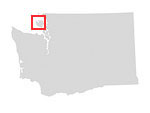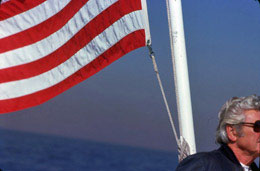







 |
 |
 |
 |
 |
 |
 |
 |
 
Ferry flag |
And I Could Have Been in Baja Whidbey Island An island hideaway. A candlelit dinner. A roaring fire. A glass of wine. And the waiters with flashlights. This has all the elements of a romantic evening, (especially those waiters), but it is merely dinner at a restaurant in Langley, a small town on Whidbey Island, Washington. A storm has knocked the electricity out. The town is shut down. The townspeople are grumbling because it’s been happening regularly. We think it’s an adventure, but then we don’t live here and have to deal with closing businesses and cooking our meals, including Thanksgiving and Christmas dinners, on the barbecue grill. Ru and I are on the way to Victoria and Vancouver, B.C. Some think we are crazy to go north in winter, especially my friend who’s left for Baja. But we don’t care. It’ll be fun, no summer traffic. We have come by way of Whidbey Island to visit friends. Langley is a small lively community of up-scale shops, art galleries, antique stores, and splendid cafes all tucked along First and Second Streets, connected by warrens of inviting passages. The next day, I explore the town looking in all the shops and galleries that were closed when we first arrived. Langley sits on a bluff above Puget Sound with a view of Saratoga Passage and Camano Island. Between rain showers I can see the North Cascade Mountains with new snow. Ru and I have an eight a.m. ferry to catch in Anacortes, with advice to get there an hour ahead, and neither of us is interested in getting up at five a.m. to drive to the ferry in the dark in a possible storm so we leave Langley and head north. On the way to Anacortes, we cruise through historic Coupeville, a quaint harbor village, studded with Victorian B&Bs. Everything is closed, save the candy store and two taverns. We admire the waterfront in rare sun and get back on the road. We cross Deception Pass, that wild narrow passage between Whidbey and Fidalgo Islands where the current runs so swiftly that British explorer, Captain George Vancouver, in 1792 was certain he’d found a river passage into a peninsula rather than an island split. We do not stop to explore the lovely little state park, or to walk on the bridge, which I have done and shall never do again, being rather afraid of heights. It’s a magnificent sight, the turbulent, churning waters way, way below. However, it’s not so fabulous if you get dizzy and your knees get weak and you have to crawl off the bridge while friends laugh. We leave the wind-swept grassy island of Whidbey into the forests of Fidalgo and find a wonderful German restaurant a few miles from the bridge. We forgo kuchen and strudels to have dessert somewhere in Anacortes. At our motel, Islands Inn, we are told there is a Dutch gourmet restaurant, La Petite, just off the lobby. We are sorry we don’t have enormous appetites to take in another meal as the menu looks terrific. Because we are only having dessert and we hope not because we are both female, we are given the worst table in the place, near the entrance, in the middle of foot traffic. Actually, the best tables don’t look that much better. They are all at the windows, but the windows look onto the motel swimming pool and hot tub surrounded by a chain link fence and a motley array of half dying cedar shrubbery. This unsettling seating (and nothing remotely chocolate) not only spoils our dessert quest but makes Ru rethink her planned trip to the hot tub. We leave a tip for the bother and drive into town considering all sorts of restaurants — Italian, A&W root beer, bars and grills, Mexican — all perfectly inviting in their way, but we are in need of chocolate. We double back toward the motel, discouraged, and then see an ice cream parlor. Open. We dash in and order hot fudge sundaes and Ru gathers reading material for us: Tractor magazines. We entertain ourselves with articles on farm machinery and notice that there are pictures on the walls of tractors. Tractors everywhere. We tell the owner, a large, pleasant looking, red faced man that we never would have thought of a tractor theme for an ice cream parlor and he informs us he collects antique tractors. I say I have a 1935 Allis Chalmers on my place and a 1929 John Deere orchard tractor that my buddy got for two cords of wood. At this, the color drains out of the poor man’s face and he wavers as though being struck. His eyes are misty. He cannot speak. I don’t know what to say, so I tell him we don’t use it, but we have fired it up, taken rides on it and danced to it in the field on summer’s eves. He nods, smiles and sways. He bobs his head back and forth. He rocks to the imaginary distinctive chug, the two-stroke beat of the old John Deere. He gives me his card in case we want to sell the John Deere and Ru and I head back to the motel where sleep is fitful listening to the howling wind and garbage lids blowing around the parking lot. The forecast is high winds and snow. I don’t look out the window to see if there’s snow. I figure snow never hurt a ferry and I just won’t think about that wind. I do, however, think about my friend in Baja. back to San Juan Islands overview
|